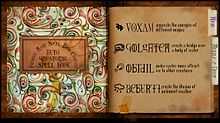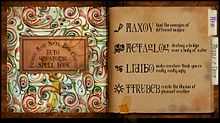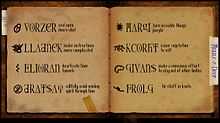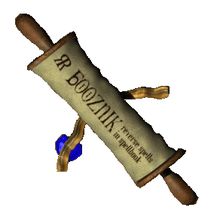Zork: Grand Inquisitor
| Zork: Grand Inquisitor | |
|---|---|
 | |
| Developer(s) | Activision |
| Publisher(s) | Activision |
| Engine | Z-vision |
| Platform(s) | Mac OS, Microsoft Windows |
| Release date(s) | |
| Genre(s) | Adventure game |
| Mode(s) | Single player, 'Linked' (network) play |
| Distribution | 2 CDs or 1 DVD-ROM |
Zork: Grand Inquisitor is a graphical adventure game, developed by Activision and released in 1997 for the IBM compatible PC and Macintosh (by MacPlay). It builds upon the Zork and Enchanter series of interactive fiction computer games originally released by Infocom. The cast includes Erick Avari, Dirk Benedict, and Rip Taylor. It is a 'point-and-click' game on 2 CD-ROMs (or one DVD that also includes Zork Nemesis) that allows the player to look around in a full circle of 360 degrees at each pre-rendered location (called 'Z-vision'). This visual freedom applies to the horizontal axis only; looking up and down is restricted, although possible in some locations.
Zork Grand Inquisitor was one of the first computer games to include true closed captioning so that the hearing impaired could play without missing any of the sound effects and spoken dialog in the game.[2]
The original release included a feelie poster with a timeline of the history of Zork up until the events of the game, with pictures and short descriptions of major events, including the backstory of some of the characters; this encompasses all released Zork games except Return to Zork, which takes place 580 years after Grand Inquisitor.
Much of the humor in Zork Grand Inquisitor stems from the ludicrous Inquisition policies and propaganda. Example quotes:
- 'Shun magic, and shun the appearance of magic. Shun everything, and then shun shunning.' - the Grand Inquisitor (Mir Yannick), played by Erick Avari.
- 'This is a paid announcement: "The Grand Inquisitor rules!"' - voice of the Inquisition, played by David Lander.
- 'And never forget who is the boss of you—Me! I am the boss of you!' - The Grand Inquisitor (Mir Yannick), played by Erick Avari.
The game also makes frequent use of self-parody, and contains numerous references and asides to staples and clichés of the traditional adventure genre; for example, two items almost invariably found and heavily used in almost all Zork games, a tattered map and an elven sword, are to be found in a glass case at the start of the game, with the notice "In case of adventure, break glass!". When the player dies, the game cuts to a computer terminal on which the player's fatal action and its consequences appear in prose form, in the fashion of the original Zork trilogy.
Plot
The player character joins forces with the Dungeon Master Dalboz (voiced by Michael McKean), whose soul was imprisoned in a lantern by the Grand Inquisitor, Yannick. Dalboz calls the player "AFGNCAAP", a satirical, politically correct initialism for "Ageless, Faceless, Gender-Neutral, Culturally Ambiguous Adventure Person"—a joking reference to many adventure games, such as Infocom's original Zork games, in which the player's character has no identity, name, or background. AFGNCAAP and Dalboz attempt to find three legendary objects that will restore all magic to the realm and bring about the fall of the Inquisitor, who intends to purge all magic from Zork and replace it with technology. The three artifacts are: the Cube of Foundation, the Coconut of Quendor, and the Skull of Yoruk. Zork Grand Inquisitor is set after the events of Zork: Nemesis and before Return to Zork. Zork: The Undiscovered Underground was written and released as a promotional prequel to the game.
The game begins in Port Foozle, which has been occupied by the Inquisition. The evening curfew has just begun. Megaphones in the streets continuously spout ridiculous propaganda, including a reminder that all residents must have standard Inquisition loudspeakers in their homes, blaring standard Inquisition propaganda at all times. Violation of any of the numerous rules of the Inquisition will result in swift totemization "courtesy of Frobozz Electric" (formerly the Frobozz Magic Company, before magic was banished). The Totemizer machine was created by the Frobozz Magic Company as an effective alternative to the death penalty. The machine fell into disuse and locked in a deserted warehouse in Fenshire until the Inquisition found it following the fall of magic. It was refurbished by Frobozz Electric to be electrical rather than magical. The process confines a person's spirit into a small metal can, a "totem," for eternity.
The player ends up in the Great Underground Empire accompanied by Dalboz, where magic spells are hidden. Spells are added to the player's spell book as they are discovered, and include rezrov, throck, obidil and snavig, many of which originated in Infocom's original series of Zork and Enchanter games. Along the way, three other characters are met, all of whom have been subject to the totemizer: a fanciful dragon named Griff, a humanoid creature called Brog, and the rightful heir to the kingdom — Lucy Flathead (played by Amy D. Jacobson). To recover the three artifacts that will restore magic, each of these three characters must be sent through time tunnels to the places where the artifacts were last known. Once recovered, they are stored in a giant, living castle.
The villain is Mir Yannick, a magic-deficient failed wizard played by Erick Avari. He discovered the long-lost Totemizer and rose to the position of Grand Inquisitor and head of the Frobozz Magic Company, which he renamed Frobozz Electric. Persecuting all magical beings and magic users, Yannick plots to cement his power by brainwashing all of Quendor with a "radical new mind-numbing technology" ("Inquizivision", a 500-channel, 24-hour TV network), but the adventurer (with the help of Dalboz, Griff, Brog, and Lucy) uses the Time Tunnels to gather the lost artifacts, and tries to use them to stop him. Yannick climbs to the top of a large radio tower to stop this, but the ensuing magical blast from the artifacts' use causes him to lose his grip and fall. Lucy is restored as the rightful Queen of Quendor.
Spells

 |
Voxam
Separate the energies of different magics. Golgatem
Create a bridge over a body of water. Obidil
Make caster more atractive to other creatures. Beburtt
Create the illusion of inclement weather. |
| Problems playing these files? See media help. | |

 |
Rezrov
Open locked or enchanted doors. Kendall
Simplify insctructions. Narwhile
Activate time tunnels. Yastard
Send spirit through time. Igram
Turn purple things invisible. Throck
Cause vegetation to grow Snavig
Change shape to that of target creature. Glorf
Untie knots. |
| Problems playing these files? See media help. | |

 |
Maxov
Bind the energies of different magics. Metaglog
Destroy a bridge over a body of water. Lidibo
Make a creature think you're really, really ugly. Ttrubeb
Create the illusion of pleasent weather. |
| Problems playing these files? See media help. | |

 |
Vorzer
Seal open doors shut. Lladnek
Make instructions more complicated. Elihwran
Deactivate time tunnels. Dratsay
Willfully avoid sending spirit through time. Margi
Turn invisible things purple. Kcorht
Cause vegetation to will. Givans
Make a conscious effort to stay out of other bodies. Frolg
Tie staff into knots. |
| Problems playing these files? See media help. | |

 |
Booznik
Reverse spells in spellbook. |
| Problems playing this file? See media help. | |
Development
The music for the game was composed by John Beal and Mark Morgan.
Critical reception
GameSpot rated Zork: Grand Inquisitor an 8/10, writing "Compact and unspectacular as it is, Zork: Grand Inquisitor is a model of adventure gaming as good entertainment. Many of the genre's conventions (FMV, item hunting, absurdist humor) get polished to a high sheen here. It is funny and reflexive without being geeky or pointlessly ironic. The third-string actors exploit their comic trademarks to good effect. Real attention is paid to the pacing of the whole affair, so there are no overly quiet dead zones of tedious activity. And the puzzles are fun to solve rather than gratuitous brain-teasing exercises."[3] Adventure Classic Gaming rated the game a 3/5 stars, writing "One of the more distinguished, entertaining games of the last several years, Zork Grand Inquisitor is light and amusing (and in some places, very funny). It strikes a good balance between its tone and subject matter. Overall, Zork Grand Inquisitor is the best looking game among the next generation titles of the Zork series. While it is a very good adventure, it is not a very good Zork.[4] Destructoid wrote an article about it in the site's Games Time Forgot series, commenting "Not only is Zork: Grand Inquisitor a clever, well-written adventure game, but it's also one of the most singularly rewarding games a fan of Zork could ever play. "[5]
Tap-Repeatedly/Four Fat Chicks gave 5 Stars, PC Jeux gave 88 out of 100, PC Zone gave 8.8 out of 10, Adrenaline Vault, The (AVault)gave 4 Stars, Quandary gave 4 Stars, Game Revolution gave B, PC Games (Germany) gave 74 out of 100, Adventurespiele gave 3.5 Stars, and Power Play gave 68 out of 100.[6]
References
- ↑ Zork: Grand Inquisitor at GameSpot.com
- ↑ Robson, Gary (1998). "Captioning Computer Games". Caption Central. Archived from the original on 2006-03-20.
- ↑ http://www.gamespot.com/reviews/zork-grand-inquisitor-review/1900-2532057/
- ↑ http://www.adventureclassicgaming.com/index.php/site/reviews/40/
- ↑ http://www.destructoid.com/games-time-forgot-zork-grand-inquisitor-29004.phtml
- ↑ http://www.mobygames.com/game/zork-grand-inquisitor/mobyrank
External links
| Wikiquote has quotations related to: Zork: Grand Inquisitor |
- Explanation of how to full-install ZGI on an XP system.
- Explanation of how to set up ZGI on Linux with Wine (includes full-install).
- Return to Hotel New Zork - Mirror of the Activision promotional mini site 'Hotel New Zork' (as archived at the Internet Archive.
- Zork: Grand Inquisitor at MobyGames
- Zork Grand Inquisitor - Adventure Classic Gaming Game Summary Information & Review
- Zork Grand Inquisitor at The JAVE
- Zork: Grand Inquisitor at the Internet Movie Database
- Open and free zork engine
| ||||||||||||||||||||||